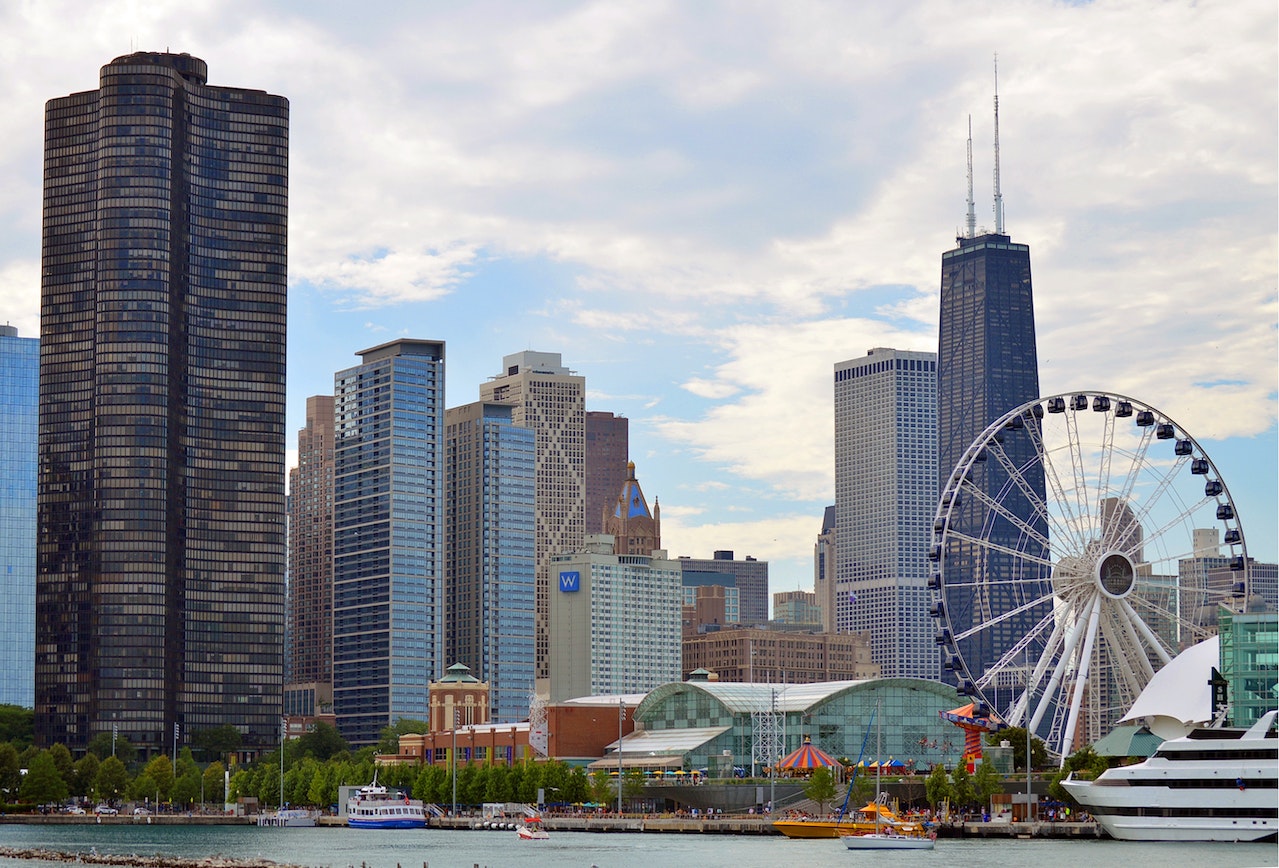-
Table of Contents
- Introduction
- The Economic Impact of Hosting the Olympics in Chicago
- Chicago’s Infrastructure Preparedness for the 2016 Summer Olympics
- The Environmental Impact of Hosting the Olympics in Chicago
- Chicago’s Cultural Offerings for Olympic Visitors
- Security Measures for the 2016 Summer Olympics in Chicago
Introduction
Chicago submitted a bid to host the 2016 Summer Olympics, competing against Madrid, Rio de Janeiro, and Tokyo. The bid was officially announced in 2006 and included plans for new venues, transportation improvements, and a focus on sustainability. Despite strong support from then-President Barack Obama and other high-profile figures, Chicago was ultimately eliminated in the first round of voting by the International Olympic Committee.
The Economic Impact of Hosting the Olympics in Chicago
Chicago’s bid for the 2016 Summer Olympics was a highly anticipated event that generated a lot of excitement and anticipation. The city had been preparing for this moment for years, and the bid was seen as a once-in-a-lifetime opportunity to showcase Chicago to the world. While there were many factors that contributed to Chicago’s bid, one of the most significant was the potential economic impact that hosting the Olympics could have on the city.
The economic impact of hosting the Olympics is a complex issue that has been studied extensively by economists and other experts. While there are many potential benefits to hosting the Olympics, there are also significant costs and risks that must be considered. In the case of Chicago’s bid, the potential economic impact was a major factor in the decision to pursue the Olympics.
One of the most significant economic benefits of hosting the Olympics is the boost to the local economy. The influx of tourists and visitors can generate significant revenue for local businesses, including hotels, restaurants, and retail stores. In addition, the construction of new facilities and infrastructure can create jobs and stimulate economic growth in the region.
However, there are also significant costs associated with hosting the Olympics. The construction of new facilities and infrastructure can be expensive, and there is always the risk of cost overruns and other unforeseen expenses. In addition, the influx of tourists and visitors can put a strain on local resources, including transportation, housing, and public services.
Despite these risks, many cities have successfully hosted the Olympics and seen significant economic benefits as a result. For example, the 2008 Summer Olympics in Beijing generated an estimated $146 billion in economic activity, while the 2012 Summer Olympics in London generated an estimated $17 billion in economic activity.
In the case of Chicago’s bid, the potential economic impact was a major factor in the decision to pursue the Olympics. The city had already invested significant resources in preparing for the bid, including the construction of new facilities and infrastructure. In addition, the city had a strong track record of hosting major events, including the World Series and the Super Bowl.
Despite these advantages, Chicago’s bid ultimately fell short. The city was eliminated in the first round of voting, with Rio de Janeiro ultimately winning the bid to host the 2016 Summer Olympics. While this was a disappointment for Chicago and its supporters, it also highlighted the challenges and risks associated with hosting the Olympics.
In the end, the economic impact of hosting the Olympics is a complex issue that must be carefully considered by cities and their leaders. While there are many potential benefits to hosting the Olympics, there are also significant costs and risks that must be taken into account. Ultimately, the decision to pursue the Olympics must be based on a careful analysis of the potential economic impact, as well as other factors such as the city’s infrastructure, resources, and ability to manage the event.
Chicago’s Infrastructure Preparedness for the 2016 Summer Olympics
Chicago’s bid for the 2016 Summer Olympics was a highly anticipated event that brought excitement and anticipation to the city. The bid was a culmination of years of planning and preparation, with the city working tirelessly to ensure that it was ready to host the world’s biggest sporting event. One of the key areas of focus for the city was its infrastructure preparedness, which was critical to the success of the bid.
Chicago’s infrastructure is one of the most advanced in the world, with a modern transportation system, state-of-the-art stadiums, and world-class hotels. The city’s transportation system is one of the most efficient in the world, with a network of highways, railways, and airports that connect the city to the rest of the world. The city’s airports, O’Hare International Airport and Midway International Airport, are among the busiest in the world, with millions of passengers passing through them every year.
In addition to its transportation system, Chicago has a number of world-class stadiums that are capable of hosting large-scale events. The city’s most famous stadium is Soldier Field, which is home to the Chicago Bears and has a seating capacity of over 61,000. The stadium has undergone extensive renovations in recent years, including the addition of a new state-of-the-art video board and a new sound system.
Another key area of focus for the city was its hotel infrastructure. Chicago has a number of world-class hotels that are capable of accommodating large numbers of visitors. The city’s most famous hotel is the Palmer House Hilton, which is one of the oldest and most iconic hotels in the city. The hotel has undergone extensive renovations in recent years, including the addition of new rooms and suites, as well as a new fitness center and spa.
Chicago’s infrastructure preparedness was also evident in its ability to handle large-scale events. The city has a number of experienced event planners and organizers who have worked on some of the biggest events in the world. These professionals were instrumental in ensuring that the city was ready to host the 2016 Summer Olympics, with a comprehensive plan in place to handle everything from transportation to security.
One of the key challenges that the city faced in its bid for the 2016 Summer Olympics was the need to balance the needs of the event with the needs of the city’s residents. The city worked closely with local communities to ensure that the event would have a positive impact on the city, while also minimizing any negative effects. This included extensive outreach and education programs, as well as the creation of new parks and green spaces for residents to enjoy.
Overall, Chicago’s infrastructure preparedness was a critical factor in its bid for the 2016 Summer Olympics. The city’s modern transportation system, world-class stadiums, and top-notch hotels were all key factors in its success. In addition, the city’s experienced event planners and organizers were instrumental in ensuring that the event was a success. While Chicago ultimately lost its bid for the 2016 Summer Olympics, the city’s infrastructure preparedness was a testament to its commitment to hosting world-class events and its ability to handle large-scale events with ease.
The Environmental Impact of Hosting the Olympics in Chicago
Chicago’s bid for the 2016 Summer Olympics was met with both excitement and concern. While the prospect of hosting the world’s largest sporting event was thrilling, many were worried about the environmental impact it would have on the city. In this article, we will explore the potential environmental consequences of hosting the Olympics in Chicago.
One of the most significant concerns was the impact on air quality. The influx of visitors and athletes would undoubtedly increase the number of cars on the road, leading to higher levels of air pollution. Additionally, the construction of new facilities and infrastructure would require a significant amount of energy, further contributing to air pollution. However, the city of Chicago had a plan to mitigate these effects. They proposed using public transportation to transport athletes and visitors, reducing the number of cars on the road. Additionally, they planned to use renewable energy sources to power the new facilities, reducing the carbon footprint of the games.
Another concern was the impact on water quality. The construction of new facilities and infrastructure would require a significant amount of water, potentially putting a strain on the city’s water supply. Additionally, the increased number of visitors and athletes could lead to higher levels of water pollution. However, the city had a plan to address these concerns as well. They proposed using rainwater harvesting systems to collect and reuse water, reducing the strain on the city’s water supply. Additionally, they planned to implement strict regulations on waste disposal to prevent water pollution.
The construction of new facilities and infrastructure was also a concern for many. The construction process can be incredibly disruptive to the environment, leading to deforestation, soil erosion, and habitat destruction. However, the city had a plan to minimize these effects. They proposed using sustainable building materials and construction methods, reducing the amount of waste generated during the construction process. Additionally, they planned to implement strict regulations on land use to prevent habitat destruction.
Finally, the impact on wildlife was a concern for many. The construction of new facilities and infrastructure could disrupt the natural habitats of local wildlife, potentially leading to their displacement or even extinction. However, the city had a plan to address these concerns as well. They proposed implementing strict regulations on land use to protect wildlife habitats. Additionally, they planned to work with local conservation organizations to ensure that any disruption to wildlife habitats was minimized.
In conclusion, while hosting the Olympics in Chicago would undoubtedly have some environmental impact, the city had a comprehensive plan to mitigate these effects. By using public transportation, renewable energy sources, rainwater harvesting systems, sustainable building materials, and strict regulations on waste disposal and land use, the city hoped to minimize the impact on air and water quality, wildlife habitats, and the environment as a whole. While there is always room for improvement, Chicago’s bid for the 2016 Summer Olympics demonstrated a commitment to sustainability and environmental responsibility.
Chicago’s Cultural Offerings for Olympic Visitors
Chicago’s bid for the 2016 Summer Olympics was a highly anticipated event that brought excitement and anticipation to the city. The city’s cultural offerings were a significant factor in the bid, as Chicago boasts a rich and diverse cultural scene that would have been a major draw for Olympic visitors.
Chicago is home to some of the world’s most renowned museums, including the Art Institute of Chicago, the Museum of Contemporary Art, and the Field Museum of Natural History. These museums offer a wide range of exhibits and collections that showcase the city’s rich history and cultural heritage. The Art Institute of Chicago, for example, is home to one of the largest collections of Impressionist and Post-Impressionist art in the world, while the Field Museum of Natural History houses an extensive collection of artifacts and specimens that tell the story of the natural world.
In addition to its museums, Chicago is also known for its vibrant music scene. The city has a long history of producing some of the world’s most influential musicians, including Muddy Waters, Buddy Guy, and Kanye West. Visitors to the city can experience live music at a variety of venues, from intimate jazz clubs to large concert halls.
Chicago is also home to a thriving theater scene, with numerous theaters and performance spaces throughout the city. The Steppenwolf Theatre Company, for example, is one of the city’s most renowned theaters, known for producing groundbreaking and innovative productions. The Chicago Shakespeare Theater is another popular destination for theater-goers, offering a wide range of productions that showcase the city’s rich literary heritage.
Food is another major draw for visitors to Chicago, with the city’s diverse culinary scene offering something for everyone. From deep-dish pizza to hot dogs to gourmet cuisine, Chicago’s restaurants and food trucks offer a wide range of options that reflect the city’s cultural diversity. Visitors can also experience the city’s famous food festivals, such as the Taste of Chicago and the Chicago Gourmet, which showcase the city’s culinary offerings in a festive and lively atmosphere.
Finally, Chicago’s architecture is another major draw for visitors to the city. The city is home to some of the world’s most iconic buildings, including the Willis Tower (formerly known as the Sears Tower), the John Hancock Center, and the Tribune Tower. Visitors can take architectural tours of the city, which showcase the city’s rich architectural heritage and highlight some of its most famous buildings.
In conclusion, Chicago’s cultural offerings would have been a major draw for Olympic visitors, showcasing the city’s rich history and cultural diversity. From its world-renowned museums to its vibrant music and theater scenes to its diverse culinary offerings, Chicago has something for everyone. While the city’s bid for the 2016 Summer Olympics was ultimately unsuccessful, its cultural offerings continue to attract visitors from around the world, making it a must-visit destination for anyone interested in experiencing the best of American culture.
Security Measures for the 2016 Summer Olympics in Chicago
The 2016 Summer Olympics was a highly anticipated event that was held in Rio de Janeiro, Brazil. However, before the games were awarded to Rio, Chicago was one of the cities that was in the running to host the event. Chicago’s bid for the 2016 Summer Olympics was a strong one, and the city had put in place several security measures to ensure the safety of athletes, spectators, and residents.
One of the key security measures that Chicago had planned was the use of advanced technology. The city had planned to use a state-of-the-art security system that would have included surveillance cameras, facial recognition software, and other advanced technologies. This system would have allowed law enforcement officials to monitor the city in real-time and respond quickly to any potential threats.
In addition to the use of technology, Chicago had also planned to increase the number of police officers on the streets during the games. The city had planned to deploy thousands of police officers, including officers from other cities and states, to ensure that the games were safe and secure. These officers would have been trained in crowd control, anti-terrorism tactics, and other security measures.
Chicago had also planned to work closely with federal law enforcement agencies, including the FBI and the Department of Homeland Security. These agencies would have provided additional resources and expertise to help ensure the safety of the games. Chicago had also planned to work with international law enforcement agencies to share information and coordinate efforts to prevent any potential threats.
Another key security measure that Chicago had planned was the use of a secure perimeter around the Olympic Village and other key venues. This perimeter would have been patrolled by armed guards and would have included checkpoints where all individuals entering the area would have been screened for weapons and other potential threats.
Chicago had also planned to work closely with private security firms to provide additional security for the games. These firms would have provided security for hotels, restaurants, and other venues that were not directly related to the games but were likely to be frequented by athletes and spectators.
Finally, Chicago had planned to implement a comprehensive emergency response plan in the event of a security threat or other emergency. This plan would have included procedures for evacuating venues, providing medical assistance, and communicating with the public.
In conclusion, Chicago’s bid for the 2016 Summer Olympics was a strong one, and the city had put in place several security measures to ensure the safety of athletes, spectators, and residents. These measures included the use of advanced technology, an increased police presence, collaboration with federal and international law enforcement agencies, a secure perimeter around key venues, private security firms, and a comprehensive emergency response plan. While Chicago ultimately did not win the bid to host the games, the city’s efforts to ensure the safety of its residents and visitors serve as an example of the importance of security measures in large-scale events.
0



